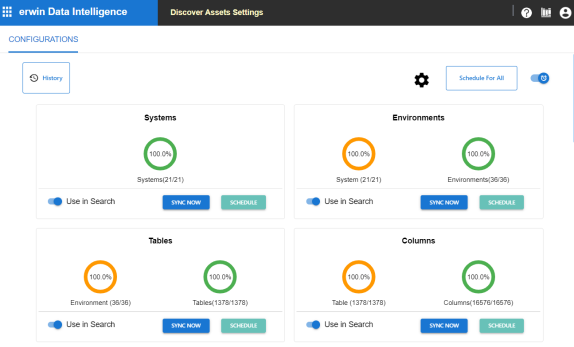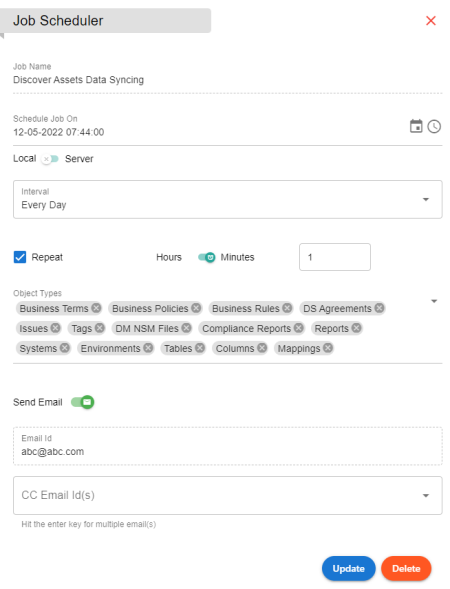On the Discover Assets Settings page, you can configure the Discover Assets module with respect to synchronizing asset properties and values with the corresponding asset properties and values configured in respective modules. After synchronization is complete for assets, you can discover and analyze their status. You can also schedule synchronization jobs, control asset types available in the Discover Assets module, and view activity logs.
To configure the Discover Assets module, follow these steps:
- Go to Application Menu > Settings > Discover Assets.
- On the configuration page, use the following options:
- Disable Schedule for All (
 )
) -
Use this option to enable or disable scheduling of synchronization jobs for all asset types. This enables the Schedule for All option, and scheduling jobs at individual asset level is disabled.
- Schedule for All
-
Use this option to schedule a synchronization job for all the asset types. The synchronization activity starts at the scheduled time for all the asset types.
- History (
 )
) -
Use this option to view activity logs of all synchronization activities.
- Include Extended Property (
 )
) -
Use this option to switch Include Extended Properties option ON. This displays the extended properties of assets that are configured as filters in the Discover Assets module. You can configure the extended properties as filters for technical and business assets.
- On the asset type card, use the following options:
- Use in Search (
 )
) -
Use this option to enable asset discovery for an asset type.
- Sync Now
-
Use this option to start synchronization activity immediately for an asset type.
- Schedule
-
Use this option to schedule a synchronization job for an individual asset type. This option is only available if the Disable Schedule for All is switched OFF.
The Discover Assets Settings page appears.

Scheduling Synchronization Jobs
Apart from scheduling a sync job, you also can manually sync the asset properties and values individually on the asset type card. To sync them manually, on an asset type card. click Sync Now.
To schedule synchronization jobs, follow these steps:
- On an asset type card, click Schedule.
- Enter appropriate values in the fields. Refer to the following table for field descriptions.
- Local: Indicates that job uses date and time on your local machine
- Server: Indicates that the job uses the date and time of a machine where your application is deployed
- Only Once: Indicates that the job runs only once
- Every Day: Indicates that the job runs everyday
- Every Week: Indicates that the job runs weekly
- Every Month: Indicates that the job runs monthly
- Click Update.
The Job Scheduler page appears.

|
Field Name |
Description |
|---|---|
|
Job Name |
Specifies the job name. For example, Systems_1650468274963. This field auto-populates a job name and is uneditable. |
|
Schedule Job On |
Specifies the date and time of the job. For example, 03-24-2020 11:45. |
|
Local or Server |
Specifies whether the job uses local or server time. |
|
Interval |
Specifies the frequency of the job. |
|
Repeat |
Specifies whether the job repeats everyday. This field is available only when Interval is set to Every Day. Additionally, you can set the repeat time based on hours or minutes. |
|
Object Types |
Specifies the object types for which the job is scheduled. This field is available only when you use Schedule For All option. |
|
Send Email |
Specifies whether job notifications are sent to your email ID and the email IDs mentioned in CC Email Id(s) field |
|
Email Id |
This field is auto-populated with your email ID. You receive email notifications about the scheduled job from the administrator's email ID. |
|
CC List |
Specifies the other email IDs that receive job notifications. Enter a comma-separated list of email IDs that should receive email notifications about the scheduled job. For example, ab.dav@xyz.com, cal.kai@xyz.com |
The synchronization job is scheduled.
|
Copyright © 2022 Quest Software Inc. |